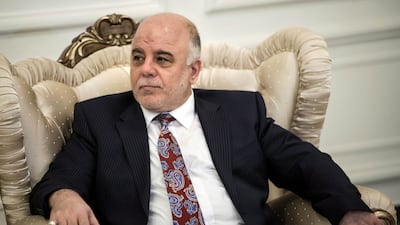After escalating public protests about the country’s pervasive corruption and failing utilities, Iraqi prime minister Haider Al Abadi has proposed wide-ranging reforms to tackle these areas. He will have a short time in which to show to an increasingly angry populace whether his changes will make a real difference or will be merely cosmetic in nature.
There can be no doubt that corruption is a significant problem that has blighted Iraq since at least the start of the Saddam Hussein era in 1979 and has been exacerbated by the instability and sectarianism that followed the 2003 invasion. By one analysis, $1 trillion (Dh3.7tn) of Iraqi money disappeared or was wasted during the premiership of Mr Al Abadi’s predecessor, Nouri Al Maliki. This money could have been used to upgrade utilities and other vital infrastructure.
Despite Mr Al Abadi’s accession and recent rises in the country’s oil revenues, Iraqis’ quality of life and prospects have continued to crumble. Public anger reached a flashpoint in the past week, when the country was baked in a heatwave but – despite repeated promises by authorities to fix the electricity supply – most people only had power for a few hours each day. On this issue at least, Mr Al Abadi has succeeded in uniting Iraq – protesters spanned the breadth of the country’s factions, including his own religious group.
The cabinet unanimously approved the reforms to target corruption, including having allegations of graft assessed by a board of experts, and those to cut costs. Part of the latter will involve eliminating Iraq’s three vice-presidential posts and that of the deputy prime minister, which will directly affect Mr Al Maliki. He is thought to harbour ambitions for a return to power despite a premiership in which sectarian divisions intensified, helping contribute to the rise of ISIL. He issued a statement supporting the changes.
At the core of the public anger is a perception that the political class are serving only their own interests. The powerful elites in Iraq stand to lose if the reforms do make a real difference, which is why some analysts are questioning whether they are being proposed with genuine intent. Iraqis have good reason to feel aggrieved and to demand an end to cronyism and corruption – and Mr Al Abadi must hear them and act in the country’s interests. The time for excuses is over.

